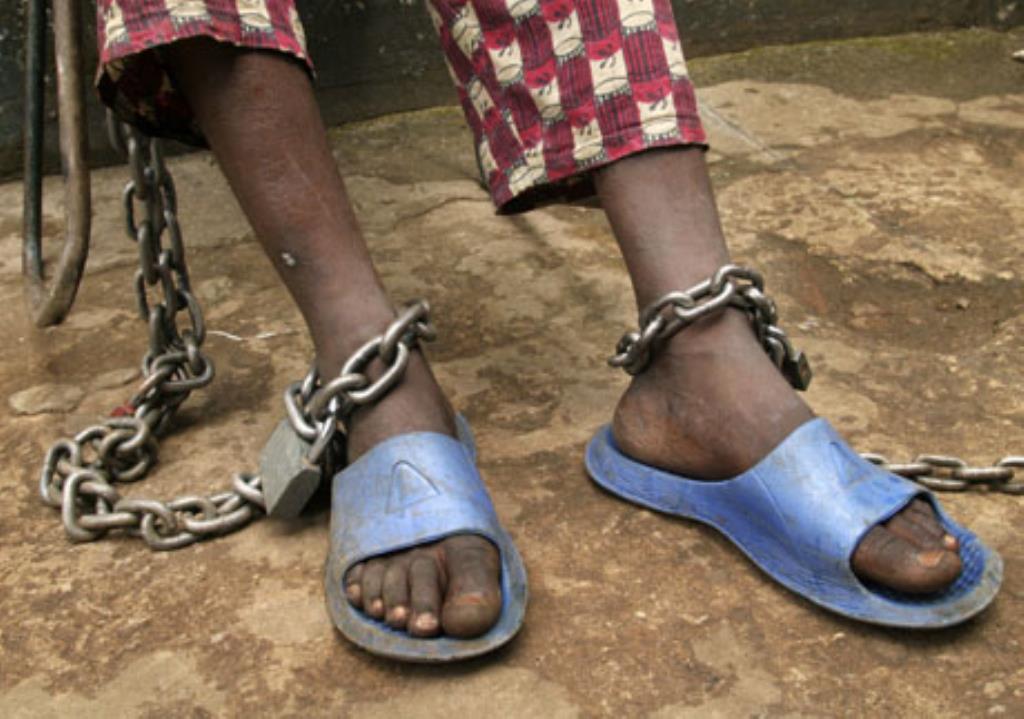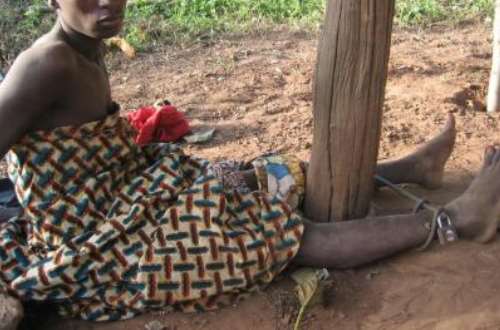A GNA Feature by Christiana Afua Nyarko
Accra, Aug 18, GNA – Mental health is one of the least talked about issues in Ghanaian social and family circles. The subject is hushed, a situation that has arisen from fear of stigmatisation.
In a typical Ghanaian society, sufferers of the predicament are often confined, rejected or neglected. Rarely, a few fortunate ones get some form of treatment and dignity from their families and, sometimes, friends.
Prayer camps located in peri-urban localities have become, for patients and their families places that promises a cure. A visit to such camps, homes, bases of some herbalists, or spiritualists would reveal horrifying scenes of mentally ill persons restrained with chains in rooms, or tied to trees as part of the supposed treatment. There have been many reports and instances of such scenes in the media.

Although the practice, inhumane at it is, is frowned upon by the Ghana Mental Health Authority and the World Health Organisation alike, it doesn’t seem to go away.
The Statistics
The grim reality of mental health in the country cannot be overlooked, considering the rising number of cases. Current statistics from the Ghana Mental Health Authority and the World Health Organisation suggest an estimated 3.1 million Ghanaians, representing 10 per cent of the estimated 31 million total population having a form of mental disorder or another, with about 16,000 of the cases reported to be severe.
It is estimated, also, that about 20,000 mentally ill persons roam the streets nationwide, as of 2021 with more than 1600 reported to be in Accra and Tema alone, and ttheir number projected to rise further.
Moreover, the WHO data reveals a more disturbing reality that 41 per cent of Ghanaians currently experiencing psychological distress.
The above statistics do not only portray the dire situation of the country with respect to mental health, but also, shed light on the level of commitment and seriousness that State authorities attached to the issue.
The current state of mental healthcare
Despite Ghana’s ratification of the UN Convention on the Rights of Persons with Disabilities and the enactment of the Mental Health Act 846 (2012), which seeks to improve the quality of mental healthcare, and stop rights violations against patients, many gaps still remain.
An example is the lack of adequate mental health personnel and facilities to deal with the ever-increasing menace. Currently, the country can only boast of three major health facilities dedicated to treating mental illnesses. These are the Accra Psychiatric Hospital, Ankaful Psychiatric Hospital at Ankaful near Cape Coast and another at Pantang on the Abokobi road.
As it stands now, there is an estimated 2,463 psychiatric nurses, 39 psychiatric doctors, 244 psychologists, four occupational therapist, 362 mental health social workers and five additional regional hospitals delivering mental healthcare services to the over 31 million Ghanaians.
Another obstacle to mental healthcare delivery is that the cost of treatment is not listed on the National Health Insurance Scheme (NHIS) thus making treatments unaffordable to many, thereby inconveniencing patients from poor backgrounds.
The mental health situation is a time bomb that can soon explode into something else unimaginable, if drastic, concrete measures and interventions are not taken sooner to address it.
It’s a pitiful sight watching several mentally ill persons roam the streets of Accra and other major cities and towns. Dirty, smelly, unkempt, in tattered clothing for long periods, or sometimes naked, these individuals loiter about with some carrying all sorts of litter which they sometimes spread around.
Left to their fate and to survive on their own, many do eat from garbage cans, scraps fallen on the ground, snatched from vendors, or begged for from people passing by.
Some of these free-roaming mentally ill patients are also known to be violent. For instance, an incident happened on Tuesday, 2nd August this year, when a mentally ill woman attacked and repeatedly hit the head of motorbike rider with a piece of rock on the Kwame Nkrumah Interchange.
The motor rider was rescued and taken to hospital by those around. The supposed ‘lunatic’ would have been lynched by an irate mob had there not been a Police intervention. She was taken to the Nima police station where she got processed for court and later referred to a psychiatric facility by the judge.
There are several accounts of such mentally ill persons running after people, defecating in the open, drinking from dirty drains, wielding sharp objects, smoking substances among other abnormal behaviours.

Way forward
Though Ghana launched a Mental Health Policy in April last year to provide a framework that would ensure quality mental healthcare is decentralised, available and accessible to those in need of it, there is still a lot more to be done.
While decentralizing the mental healthcare system pursuant to the Mental Health Act 846, commemorating mental health day to sensitize the masses and expanding existing facilities as it is been currently done with the Accra Psychiatric Hospital are good steps, they are just not enough.
What’s needed, in addition, is the deliberate action to take mentally ill persons off the streets into care.
There should be in place, intensive, intentional and tailor-made educational campaigns by the Mental Health Authority, Ghana Health Service, and Ministry of Health in collaboration with Mental Health related NGOs, with the aim to stop and prevent stigmatisation associated with mental health patients.
According to Matt Haig, the mental health advocate, mental health problems “don’t define who a person is, because it is something they experience, like taking a walk in the rain but not in the rain.” In this regard, laws banning discrimination, neglect and abandonment of mentally ill individuals by families should be enacted by Parliament, and offenders should be made to face the full rigours of the law.
There should be a conscious effort from the Government to train more mental health personnel by all means possible. One of such is by offering scholarships to students wishing to work in the health sector.
Personnel after benefiting from these scholarship schemes and completing their studies should be remunerated well and also bonded as a means to curb brain drain.
Reintegration programmes should be instituted to help former patients and their families and communities. Also, the Livelihood Empowerment against Poverty (LEAP) programme provides another opportunity for support for such cured persons. The young ones, for example, could be enrolled into the Youth Enterprise programme, where they would acquire skills and capital to start self-sustaining enterprises so they don’t become extra burden on their families.
As earlier expressed by the Mental Health Authority’s Director-General, Dr. Akwasi Osei, more budgetary allocation and investments are required from Government and other stakeholders to mental health sector.
Above all, the treatment mental healthcare should be captured in the National Health Insurance Scheme so more Ghanaians can access such care.
It is high time Ghana takes mental health issued more seriously than it is doing now, considering how millions are gradually falling through the net. The earlier, the better.
GNA